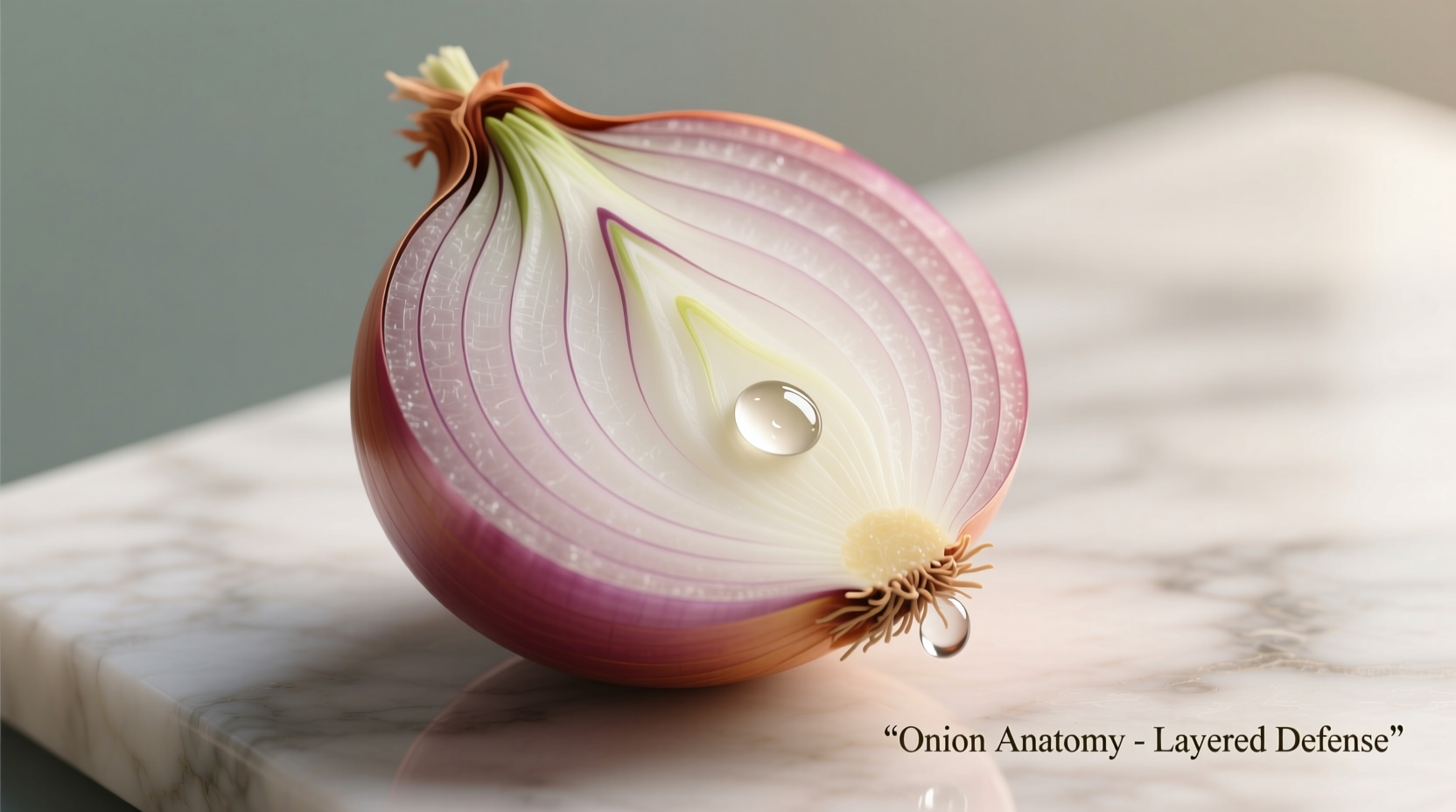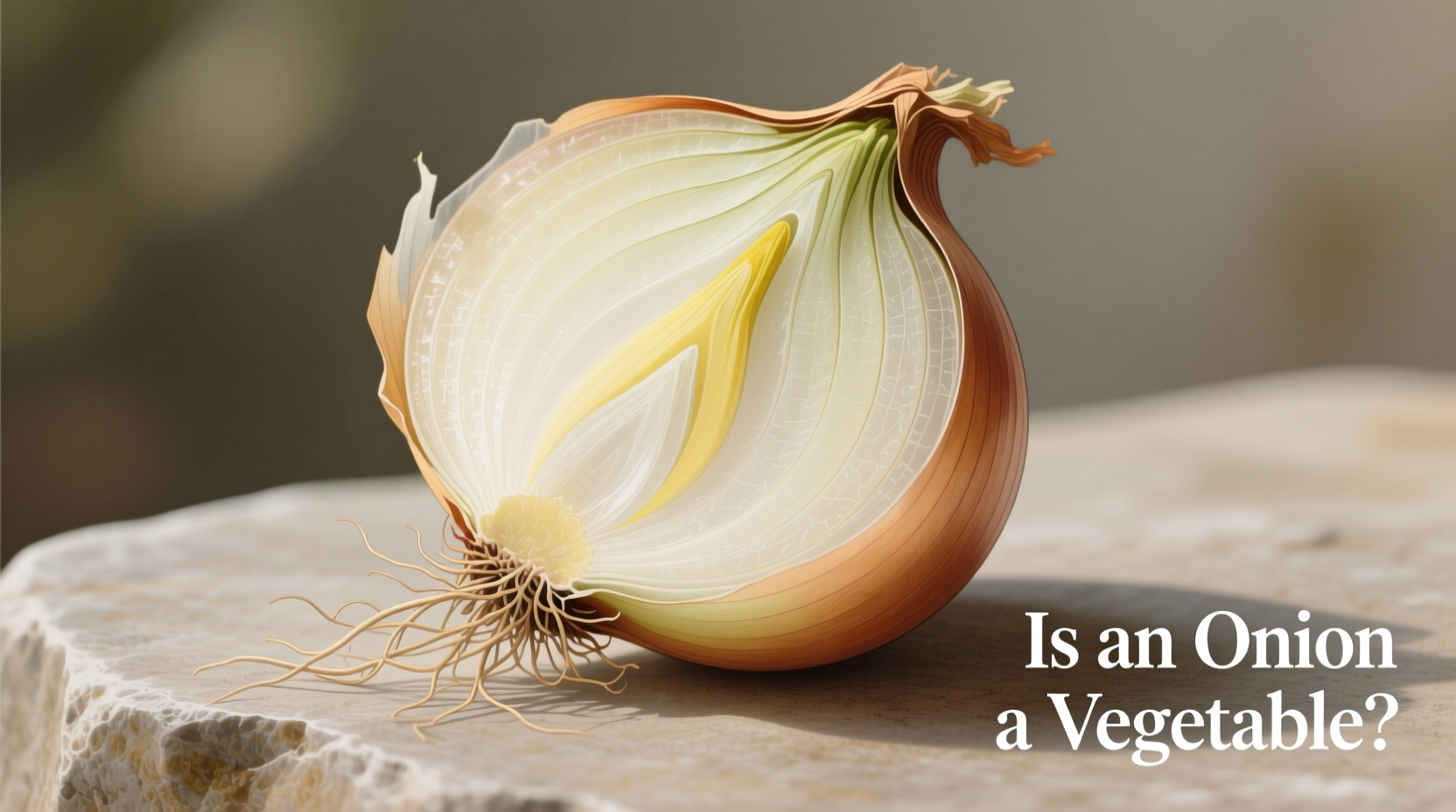When you're chopping onions for dinner and wonder is an onion a vegetable, you're tapping into a centuries-old classification debate. The straightforward answer? Culinary professionals and nutrition guidelines consistently treat onions as vegetables, while botanists categorize them as bulbs—a specialized stem structure. This dual identity explains why confusion persists, but for practical cooking and dietary purposes, onions absolutely function as vegetables.
Botanical Reality: What Onions Actually Are
From a scientific perspective, onions (Allium cepa) develop from modified underground stems called bulbs, not roots. These layered structures store energy for the plant's growth cycle. Unlike true root vegetables like carrots or potatoes (which are tubers), onions form from compressed stem tissue surrounding a central bud.
| Classification System | Onion Category | Key Characteristics |
|---|---|---|
| Botanical | Bulb (modified stem) | Layered fleshy leaves surrounding a stem base |
| Culinary | Vegetable | Savory flavor profile, used in main dishes/sauces |
| Nutritional | Non-starchy vegetable | Low calorie, high in vitamin C and antioxidants |
This USDA agricultural classification explains why botanists separate onions from root vegetables. However, as culinary historian Sarah Johnson notes, "Cooking traditions have always prioritized flavor and function over botanical precision—onions behave like vegetables in recipes, so chefs treat them as such."
Why Culinary Classification Trumps Botany in Your Kitchen
Professional kitchens and dietary guidelines—including the USDA Dietary Guidelines—classify onions as vegetables because they:
- Provide savory flavor foundations (the "holy trinity" in Cajun cooking)
- Contain minimal natural sugars compared to fruits
- Function as base ingredients in soups, stews, and sauces
- Fit nutritional vegetable profiles (low calorie, high fiber)
Consider this historical context: Before modern botany, cooks categorized ingredients by usage. Onions have been treated as vegetables since ancient Egyptian times, where they appeared in workers' rations alongside leeks and garlic. This practical tradition persists because it works—onions perform vegetable-like roles in dishes, regardless of their botanical structure.

Nutritional Perspective: Why the Debate Matters Less Than You Think
When examining is an onion a vegetable through nutrition science, the classification becomes almost irrelevant. The USDA FoodData Central lists onions in the vegetable category because they deliver:
- 40 calories per cup (raw)
- 12% of daily vitamin C needs
- Significant quercetin (a potent antioxidant)
- Negligible fat and protein
These nutritional characteristics align perfectly with vegetable profiles, not fruits or other food groups. Whether you're following Mediterranean diet recommendations or building balanced meals, onions function as vegetables nutritionally—providing flavor without excessive calories or sugars.
Practical Kitchen Implications
Understanding this dual classification helps you use onions more effectively:
- Storage: Unlike root vegetables, bulbs prefer cool, dark, dry places (not refrigeration)
- Cooking: Their layered structure caramelizes beautifully when sliced properly
- Substitutions: Shallots or leeks work similarly in recipes (all are Allium bulbs)
- Nutrition: Red onions contain more antioxidants than yellow varieties
Professional chefs consistently treat onions as vegetables because their culinary behavior matches vegetable expectations—they add depth without sweetness, form flavor bases, and complement proteins rather than dominate dishes like fruits might.
Common Misconceptions Clarified
Several persistent myths confuse the is an onion a vegetable question:
- Myth: "Onions are roots" → Fact: They're stem bulbs (roots grow downward; bulbs form horizontally)
- Myth: "Only root-growing plants are vegetables" → Fact: Culinary vegetables include stems (celery), flowers (broccoli), and leaves (spinach)
- Myth: "Botanical accuracy matters in cooking" → Fact: Chefs prioritize function—tomatoes are fruits botanically but used as vegetables
The key insight? Food classification systems serve different purposes. Botany explains plant biology; culinary tradition guides practical usage. For meal planning, recipe development, and nutrition tracking, onions unequivocally function as vegetables.
When Classification Actually Matters
While most home cooks needn't worry about the botanical distinction, these scenarios make the difference relevant:
- Gardening: Bulbs require different planting depths than root vegetables
- Allergies: Some with garlic intolerance react to other Allium bulbs
- Food Science: Bulb structure affects how onions caramelize versus root vegetables
- Dietary Restrictions: Certain religious diets classify foods differently
For 99% of cooking situations though, treating onions as vegetables remains perfectly accurate and practical. The confusion stems from applying scientific terminology to culinary contexts where functional classification serves better.











 浙公网安备
33010002000092号
浙公网安备
33010002000092号 浙B2-20120091-4
浙B2-20120091-4